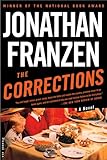 Growing up in Scotland, I knew several farmers who pronounced with Delphic confidence on the weather. On a clear December day they would forecast a blizzard; in the middle of rain they would claim a drought was coming.
Growing up in Scotland, I knew several farmers who pronounced with Delphic confidence on the weather. On a clear December day they would forecast a blizzard; in the middle of rain they would claim a drought was coming.
In the spring and summer of 2001, people who were listening could hear The Corrections coming. This oddly titled novel, by this interesting writer, was finally about to emerge. It was published on September 1st. and, despite everything else that happened that autumn, there was an unusual degree of excitement around the book, not just among critics but among readers. People read it, people talked about it, people registered that something important had occurred.
The novel itself opens with a storm. “You could feel that something terrible was going to happen. The sun low in the sky, a minor light, a cooling star. Gust after gust of disorder.” In the gorgeous, cascading pages that follow, those gusts blow through the Lambert family. Illuminated by Jonathan Franzen’s brilliant prose, bill paying, grocery shopping, depression, Christmas holidays, a walk to the corner shop become subjects of breathless interest and, often, wild humor. Over and over he gives us the deep pleasure of seeing the world around us – and the world inside us – in new ways. For once, the prophets were right.
Snow on the mountain. The winged horseman is coming. Read The Corrections.
Read an excerpt from The Corrections.
More Best Fiction of the Millennium (So Far)
Best of the Millennium, Pros Versus Readers








